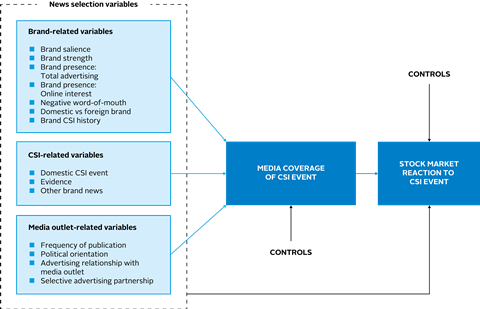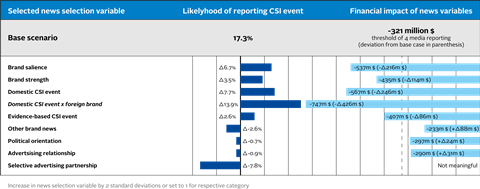By Samuel Stäbler, Assistant Professor of Marketing at Tilburg University, and Marc Fischer, Professor of Marketing at the University of Cologne
Company misdemeanours happen all over the world. Volkswagen’s emissions scandal is just one example of the many crises covered in the media. Society is increasingly focused on corporate social irresponsibility (CSI) events such as human rights violations (e.g. child labour), corruption (e.g. price fixing), and environmental scandals (e.g. oil leaks), and the role of media coverage is crucial in determining the negative consequences of such events. According to the results of our new study, published in the Journal of Marketing, unethical firm behaviour only has a negative impact on financial stock markets if it is widely publicised in the media.
Furthermore, we find that the media does not report corporate misconduct consistently and independently, with outlets often influenced by their own interests, such as advertising revenues.
The importance of story selection
Newspapers and magazines are restricted in terms of the number of articles they can publish – they are not able to report on every incident that happens in the world. Journalists don’t always choose which events to report about randomly, but rather, select them following certain editorial criteria, such as covering companies with powerful brands (see Figure 1).
As there is no empirical evidence of how journalists and editors select certain CSI events among others, we investigated under which conditions unethical firm behaviour receives significant media attention and the impact that coverage has on financial stock markets.
To identify factors that drive journalists and editors to report on unethical firm behaviour, the authors adapted the theory of news value to predict and explain when an event of unethical firm behaviour becomes news, as illustrated in the figure, and how these variables eventually influence stock market reactions.

Empirical set-up
For the study, we examined media coverage of 1,054 CSI events related to social, governance, and environmental issues in 77 leading media outlets from five countries (USA, Mexico, Germany, Great Britain and France). Furthermore, the authors used models to identify when corporate misconduct is reported – and when it is not – and how this determines the financial consequences of unethical firm behaviour.
Detrimental consequences for stock markets
If four or more US media outlets report on the unethical behaviour of a firm, the average financial loss on the US stock market due to a CSI event amounts to US$321 million. Thus, it is of utmost importance to investors and managers to understand the type and frequency of media coverage that unethical firm behaviour receives.
The results indicate that the extent of reporting is not necessarily impartial: in general, the examined online and offline newspapers and magazines frequently report on the ethical misconduct of companies with well-known brands. The number of media outlets covering a CSI story can be up to 39% higher for salient and strong brands. The media also showed a preference for events that happen at home, particularly if they involve a foreign brand: we found that 80% more media report the event if a foreign brand is involved in a domestic CSI event.
On the other hand, media tend to cover CSI news less often if it involves their advertising partners. When a brand advertises heavily or exclusively in a news medium, this reduces the likelihood of that brand receiving negative coverage. On average, one out of five outlets cover a CSI event, but only one out of 10 cover the story when the brand involved is an exclusive advertising partner.
The media fulfils an important role in democratic societies, in that they contribute to the formation of public opinion. Consumers have the right to be informed about potential firm misbehaviour in a transparent and balanced manner. Our study shows that media coverage varies significantly when it comes to reporting about a CSI event. The more popular a brand is and the more the firm stands to lose, the more likely media are to cover the story.
Our results call into question the proclaimed independence of the media. Besides politicians, who sometimes behave opportunistically, the media exert a great deal of pressure and demand compliance with the highest ethical standards and social norms from public figures and companies. Our research on CSI reporting shows that media companies themselves do not always adhere to the high ethical standards they demand of others.
Strong implications for investors
Overall, this study can help investors to predict and anticipate media attention so they can to better handle the risks of their stocks. It would be particularly helpful to predict whether a CSI event has the potential to exceed the threshold of four media outlets for the impact on the US stock market. The simulations below highlight under which conditions the stock market loss may be increased.

This blog is written by academic guest contributors. Our goal is to contribute to the broader debate around topical issues and to help showcase research in support of our signatories and the wider community.
Please note that although you can expect to find some posts here that broadly accord with the PRI’s official views, the blog authors write in their individual capacity and there is no “house view”. Nor do the views and opinions expressed on this blog constitute financial or other professional advice.
If you have any questions, please contact us at [email protected].












